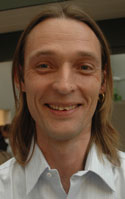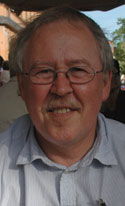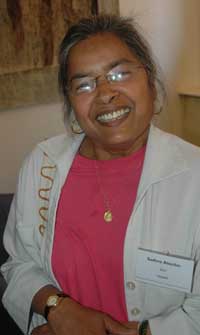SWEDISH SOUTH ASIAN STUDIES NETWORK
Meeting Global Challenges in Research Cooperation
– conference on current Swedish development research,
in Uppsala 27–29 May 2008
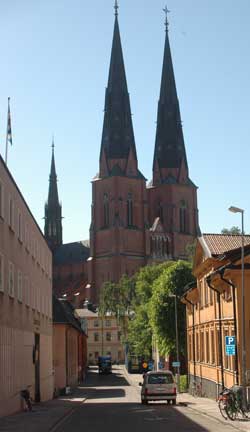
![]() • For the fourth time, Sida/SAREC – the unit for research cooperation within the the Swedish International Development Cooperation Agency Sida – financed a conference on current Swedish development research, in Uppsala 27–29 May 2008. Previously Sida has initiated three similar conferences, the first one in Göteborg in 2000, the second in Lund in 2003 (more information about the Lund conference), and the third and most recent one, focusing on ”Structures of Vulnerability:
Mobilisation and Resistance”, was held in Stockholm in 2005 (more information about the Stockholm conference).
• For the fourth time, Sida/SAREC – the unit for research cooperation within the the Swedish International Development Cooperation Agency Sida – financed a conference on current Swedish development research, in Uppsala 27–29 May 2008. Previously Sida has initiated three similar conferences, the first one in Göteborg in 2000, the second in Lund in 2003 (more information about the Lund conference), and the third and most recent one, focusing on ”Structures of Vulnerability:
Mobilisation and Resistance”, was held in Stockholm in 2005 (more information about the Stockholm conference).
The 2008 conference was organised by the Centre for Sustainable Development in Uppsala, an inter-disciplinary centre for education and research on sustainable development, jointly run by Uppsala University and the Swedish University of Agricultural Sciences (SLU) in Uppsala.
It was held at Atrium Konferens in central Uppsala.
The general theme for the three-day conference was “Meeting Global Challenges in Research Cooperation”. Researchers and development professionals were invited to gather and discuss key themes at the frontiers of research and global development issues.
The three-day conference consisted of panels, focusing on topics such as sustainable energy systems, maternal and child health, water and sanitation, soil degradation, sustainable agriculture, survival strategies of the poor, conflicts over natural resources, housing and infrastructure, human rights, democracy, global trade and climate change.
All accepted conference presentations and summaries of discussions will later be published in a book.
Nearly 450 participants, mainly researchers from different Swedish universities, but also staff from various units of Sida, and students from Uppsala University/Swedish University of Agricultural Sciences participated in the conference. A limited number of international guests were also invited. The Swedish South Asian Studies Network was represented by its Deputy Director Lars Eklund, who had informal meetings with a large number of researchers involved in the SASNET network.
Tuesday 27 May 2008
The first day of the conference, inaugurated at 13.00, was mostly devoted to introductory and keynote speeches, by the organisers and invited key speakers.
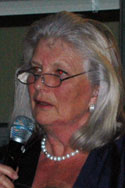 Ms.
Berit Olsson (photo to the right), Head of Sida’s Department for Research Cooperation (SAREC) talked about ”Future perspectives on international research cooperation for the
benefit of the Swedish Policy for Global Development”, pointing out a number of Swedish and international projects and organisations that benefit from Sida/SAREC support. She also presented ongoing plans to change the structure of Sida’s funding through its Developing Country Research Council (U-landsforskningsrådet). A proposal has been made to change over from funding a large number of rather small-scale research projects (with an approximate funding of SEK 550 000 per project) to funding fewer projects in selected thematic fields with more money.
Ms.
Berit Olsson (photo to the right), Head of Sida’s Department for Research Cooperation (SAREC) talked about ”Future perspectives on international research cooperation for the
benefit of the Swedish Policy for Global Development”, pointing out a number of Swedish and international projects and organisations that benefit from Sida/SAREC support. She also presented ongoing plans to change the structure of Sida’s funding through its Developing Country Research Council (U-landsforskningsrådet). A proposal has been made to change over from funding a large number of rather small-scale research projects (with an approximate funding of SEK 550 000 per project) to funding fewer projects in selected thematic fields with more money.
Another current proposal related to Sida’s funding policies is to introduce a new structure for the Swedish research councils. It means that funding for developmental projects should no longer go through Sida, but instead through the Swedish Research Council, Vinnova, and Formas. Internationalisation should be a key concept for all these research councils.
The Deputy Director of Sida, Ms. Mia Horn af Rantzien, also came up to the stage and gave further inputs to the discussion.
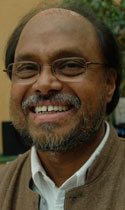 Two other keynote speakers followed. Dr Måns Fellesson, Deputy Secretary at the Swedish Ministry of Foreign
Affairs, working at the Department for Policy Development (UD-UP), talked about ”The Swedish Policy for International Development Cooperation and
the Role of Research”; and Dr Stina Gerdes
Barriere, Deputy Assistant under Secretary of State at the Swedish Ministry of Education and Research, working at its Unit for Research Policy, talked about ”Swedish research institutions and strategies for international
research collaboration”.
Two other keynote speakers followed. Dr Måns Fellesson, Deputy Secretary at the Swedish Ministry of Foreign
Affairs, working at the Department for Policy Development (UD-UP), talked about ”The Swedish Policy for International Development Cooperation and
the Role of Research”; and Dr Stina Gerdes
Barriere, Deputy Assistant under Secretary of State at the Swedish Ministry of Education and Research, working at its Unit for Research Policy, talked about ”Swedish research institutions and strategies for international
research collaboration”.
A lively discussion followed, with several people in the audience worried about the proposed changes in Sida’s funding policies. The discussion was moderated by Prof. Nadarajah Sriskandarajah (photo to the right) from the Dept. of Urban and Rural Development, Swedish University of Agricultural Sciences (SLU) in Uppsala. After the coffee break, a panel debate was then held on ”Conditions, environments, competence and infrastructure for development research at Swedish research institutions” in which Dr Fellesson and Dr Gerdes Barriere participated, along with Mr. Thomas Kjellquist, Deputy Head of Sida/SAREC; Prof. Ulf Magnusson, Vice Dean at SLU; and Dr. Henning Melber, Director at the Dag Hammarskjöld Foundation in Uppsala.
Wednesday 28 May 2008
The day was mostly set aside for a number of parallell sessions, both in the morning and the afternoon. In each panel only a selected few papers were presented live by the researchers themselves. More papers were presented in form of thematic posters, that were on display close to or in the session venues.
South Asia related papers and presentations appeared in most of the panels, as follows:
Session 1. Towards sustainable energy systems: sources, technologies and consumption
Oral presentation:
• Hans Blomkvist, Dept. of Government, Uppsala University: Bioenergy, institutions and interest groups – explaining energy systems in southern Indian states.Poster presentations:
• Daniel Bergquist, Dept. of Social and Economic Geography, Uppsala University: Towards sustainability and fairness in times of descent
• Rajni Hatti-Kaul, Dept. of Biotechnology, Lund University: Speciality chemicals from renewable resources using industrial biotechnology
• Bo Mattiasson, Dept. of Biotechnology, Lund University: Biogas as a resource-efficient vehicle fuel
• Hassan Salman, Energy Technology Centre in Piteå (ETC): Small Scale Gasification for Power Production in India
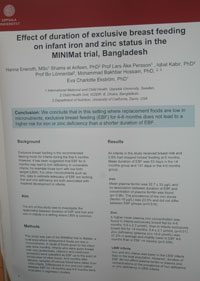 |
| One of the poster presentations in session 2. |
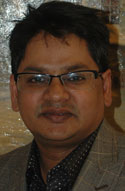 |
| Jahangir Khan defended his PhD thesis at the Division of Social Medicine, Dept. of Public Health Sciences, Karolinska Institutet, Stockholm, in 2005. More information. |
Session 2. Improving maternal health and infant child survival
Chaired by Prof. Lars-Åke Persson and Prof. Birgitta Essén, International Maternal and Child Health (IMCH), Dept. of Women's and Children's Health, Uppsala University
Poster presentations:
• Shams el Arifeen, A.M. Waheedul Hoque, Y. Shirioshi, Z. Mahmud, D.S. Alam, L-Å Persson, Eva-Charlotte Ekström, ICDDR,B, Dhaka, Bangladesh; IMCH; Uppsala University; UNICEF; and BRAC, Bangladesh: Equity in birth weight improved by a food and micronutrient supplementation programme: a cluster randomized trial in Bangladesh
• Hanna Eneroth, Shams el Arifeen, Lars-Åke Persson, I. Kabir, B Lönnerdal, M.B. Hossain, Eva-Charlotte Ekström, IMCH; Uppsala University; ICDDR,B, Dhaka, Bangladesh; Department of Nutrition, University of California, Davis, USA: Effect of duration of exclusive breast feeding on infant iron and zinc status in the MINIMat trial, Bangladesh
• Susanne Jansson and Pia Olsson, International Maternal and Child Health (IMCH), Dept. of Women's and Children's Health, Uppsala University: Adolescents’ perceptions on sexuality and reproductive health risks A qualitative study in rural Rajasthan, India
• Dr. Jahangir Khan (photo to the right), Dr. Golam Sarowar, Dr. Emma Medin, Associate professor Clas Rehnberg, Department of Learning, Informatics, Management and Ethics, Medical management centre, Karolinska Institutet, & Dr. Rukhsana Gazi, Dr. Rumana Saifi, Dr. Tracey Koehlmoos, and Dr. Abbas Bhuiyan, ICDDR,B, Health Systems and Economics Unit, Dhaka, Bangladesh: Production Cost of Pregnancy and Puerperium related Health Care Services – a pilot study
• Armin Jamshedji Neogi, Director, Monitoring and Evaluation, & Dr. Kalpana Apte, Assistant Secretary General (Programme Implementation), Family Planning Association of India: Partnerships for Change: Using Social Audit for Health Care Development
• Pia Olsson, International Maternal and Child Health (IMCH), Dept. of Women's and Children's Health, Uppsala University, and Kumudu Wijewardena, Dept of Community Medicine, Sri Jayawardenepura University, Nugegoda, Sri Lanka: Unmarried women’s decisions on abortion – qualitative interviews in Sri Lanka
• Anisur Rahman, International Maternal and Child Health (IMCH), Dept. of Women's and Children's Health, Uppsala University, and Allisyn Moran & Marge Koblinsky, ICDDR,B, Dhaka, Bangladesh: Intra-partum indicators of quality of basic emergency obstetric and neonatal care in a rural hospital at Matlab, Bangladesh
Session 3. A human rights perspective – are some rights more important?
Oral presentation:
• Dr. Kalpana Apte, Assistant Secretary General (Programme Implementation), Family Planning Association of India, Mumbai: Assessing Deprivation using an ‘Entitlement Index’ for Measuring Reproductive Health & Rights Parameters
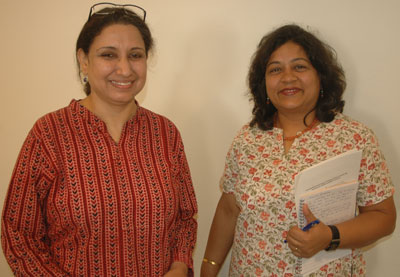 |
| Kalpana Apte and Armin Jamshedji Neogi from the Family Planning Association of India (FPAI) in Mumbai, presented an interesting paper in session 3 on the ”Entitlement Index” for measuring reproductive health and rights parameters that has been worked out by their organisation. |
Session 4. Sustainable, productive and efficient agriculture an impossible match?
Poster presentations:
• Nilanjan Ghosh, MCX Academy for Commodity Research (MACOR), Mumbai, India & Prof. Gunnar Jacks, Dept. of Land & Water Resources Technology, KTH, Stockholm: System for Rice Intensification – saving water and producing more?
• Farzana Panhwar, M.H.Panhwar Trust, Hyderabad, Pakistan: Food security and Climatic Change Effect on Pakistan Agriculture
Session 5. Water and sanitation
Poster presentations:
• Nandita Singha, Dept. of Land & Water Resources Technology, KTH, Stockholm; and Per Wickenberg, Karsten Åström & Håkan Hydén, Dept. of Sociology of Law, Lund University: Meeting the MDGs through the Human Right to Water – A gendered analysis in India from actor oriented perspective
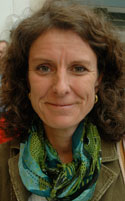 |
|
| SASNET networking members in Session 8: Anna Godhe, Department of Marine Ecology, Göteborg University, and Christer Norström, Dept. of Social Anthropology, Stockholm University. | |
Session 8. Causes and Solutions to Conflicts on Natural Resources
Chaired by Prof Adam Pain, Dept. of Urban and Rural Development, Swedish University of Agricultural
Sciences (SLU) in Uppsala.
Poster presentations:
• Anna Godhe, Maria E. Asplund and Karolina Härnström, Dept. of Marine Ecology, Göteborg University; Iddya Karunasaga, Indrani Karunasagar, P.R. Raghunath, V. Saravanan, and Anuj Tyagi, Dept. of Fishery Microbiology, College of Fisheries, Karnataka Veterinary Animal and Fisheries Sciences University, Mangalore, India; and Ann-Sofi Rehnstam-Holm, Mathematics and Natural Sciences, Kristianstad University: Inter-relation between bacteria and phytoplankton blooms in the Arabian Sea
• Christer Norström, Dept. of Social Anthropology, Stockholm University: Whose Agenda?: A Local Environmental NGO in the Middle of a Turmoil of Perspectives
• Dr. Khan Rubayet Rahaman, Md. Humayun Kabir, Md. Zakir Hossain, and Md. Ashiq-ur-Rahman, Urban and Rural Planning Department, Khulna University, Bangladesh: Study of Freshwater Wetland Management of Southwestern part of Bangladesh A case study of Beel Dakatia, Dumuria, Khulna
In the afternoon, a panel session on ”The undergraduate, post-graduate and post-doc
perspective on education and career opportunities in development
research” was organised. The participants included Andreas Godsäter from Göteborg University, and Jakob Grandin from Uppsala University.
All through the day, opportunities were given to comment on the research funding modalities to Sida Sarec “Uforsk”
staff at a table in the conference hall.
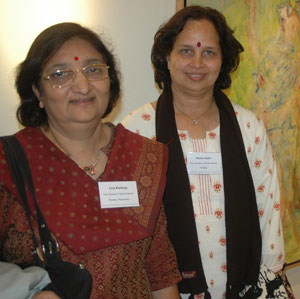 |
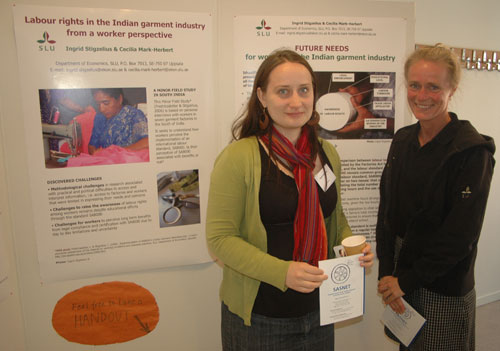 |
|
| Lina Kashyap and Neela Dabir from Tata Institute of Social Sciences (TISS) in Mumbai, India. Visiting Sweden in connection with a Linnaeus Palme exchange programme with Gävle University. | ||
|
|
Poster exhibition by PhD Candidate Ingrid Stigzelius and Dr. Cecilia Mark-Herbert from the Dept. of Economics, Swedish University of Agricultural Sciences (SLU) in Uppsala. Ingrid has made a Minor Field Study (MFS) on ”Labour rights in the Indian garment industry from a worker perspective”. The poster exhibition was shown in connection to session no 3 on Human Rights. |
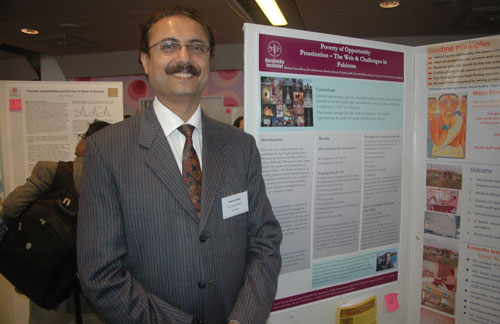 |
||
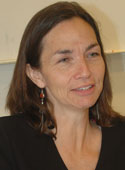 |
Mohsin Saeed Khan from the Department of Public Health Sciences, Division of International health (IHCAR) at Karolinska Institutet Medical University, Stockholm, presented a poster exhibition titled ”Poverty of Opportunity. Prostitution – the Web and Challenges in Pakistan”. | |
| Photo to the left: Heidi Moksnes, Collegium for Development Studies, Uppsala Centre for Sustainable Development; and Peder Hjort, Division of Water Resources Engineering, Department of Building and Environmental Technology, School of Civil Engineering, Lund University. | ||
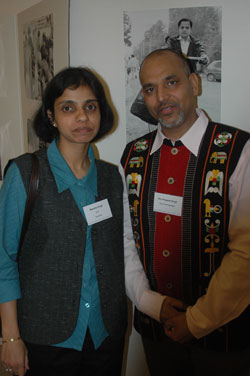 |
| Nandita Singh from the Department of Land and Water Resources Engineering; School of Architecture and the Built Environment, Royal Institute of Technology (KTH), Stockholm, participated in session no 5. Nandita and her husband, Mr. Om Prakash Singh, also presented a poster exhibition on the water problems the citizens of Delhi face. The exhibition was titled ”Human Right to Water – Reality or a Fantasy?” |
Thursday 29 May 2008
In the morning there were a new set of parallell sessions. In each panel only a selected few papers were presented live by the researchers themselves. Just like the day before, more papers were presented in form of thematic posters.
Session 9. Challenges to democratic quality:
the role and meaning of political opposition
Poster presentation:
• Kerstin Andersson, Division of Social Anthropology, School of Global Studies, Göteborg University: Democratic processes and elite groups in Kolkata, India
Session 10. Challenges to democratic quality:
the role and meaning of political opposition
Oral presentation:
• Dr. Krishan Deheragoda, Department of Geography, University of Sri Jayewardenepura, Sri Lanka: Shelter Issue of Urban Poor: Case Study from Sri Lanka
Session 12. Challenges to democratic quality:
the role and meaning of political opposition
Poster presentation:
• Johan Burman, Dept. of Earth Sciences, Göteborg University; and Divakar Naidu, National Institute of Oceanography, Dona Paula, Goa, India: Indian Coastal Surface-Water Conditions in the Arabian Sea recorded by Gastropod Shell Isotope Chemistry of Littoraria Undulata
Panel debate on Swedish research funding
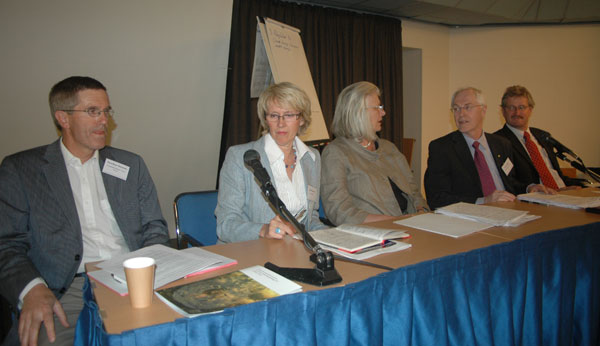 |
| From left to right: Hans-Örjan Nohrstedt, Lena Gustafsson, Berit Olsson, Gunnar Öqvist and Pär Omling. |
On this final day of the conference, representatives from the Swedish research councils met in the afternoon for a panel discussion titled ”Strategies for Swedish funding of international research cooperation”. Berit Olsson, Head of SAREC, again presented Sida’s proposed new research funding strategy. Pär Omling, Director General, Swedish Research Council; Lena Gustafsson, First Deputy Director General, Swedish Governmental Agency for Innovation Systems (Vinnova); and Hans-Örjan Nohrstedt, Head for the Unit on Strategy and Analysis, The Swedish Research Council Formas, presented their present work and ideas for the future. The discussion was moderated by Gunnar Öqvist, Permanent Secretary, Royal Academy of Science; and also Chair, Sida Research Committee.
Lars Eklund/SASNET
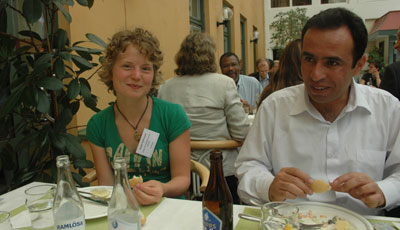 |
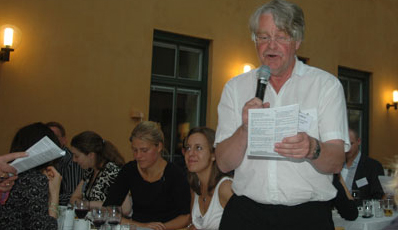 |
| Sophie Hellstrand, student from the Department of Biosciences and Nutrition (NOVUM) at Karolinska Institutet Medical University in Stockholm, and Dr. Nazir Qayoome, Rural Coordination Coordinator for the Swedish Committee for Afghanistan (SCA), who had come to Sweden in connection with the SCA’s annual meeting. | SASNET’s Deputy Director Lars Eklund entertains the guests with lead singing a Swedish song at the conference dinner held in Vinterträdgården on the second night of the conference. |
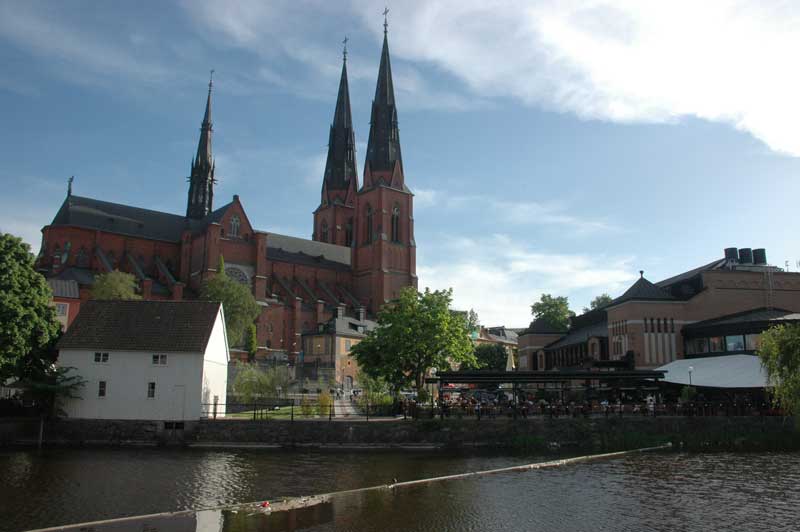 |
|
SASNET - Swedish South Asian Studies Network/Lund
University
Address: Scheelevägen 15 D, SE-223 70 Lund, Sweden
Phone: +46 46 222 73 40
Webmaster: Lars Eklund
Last updated
2008-06-11
